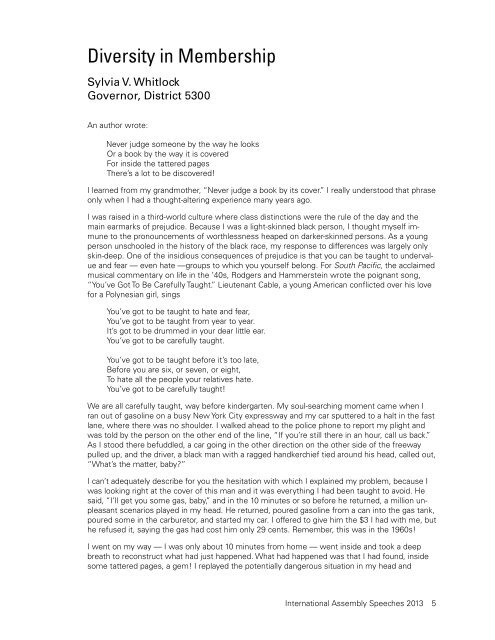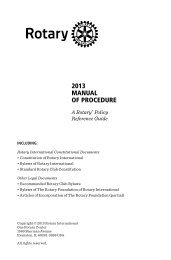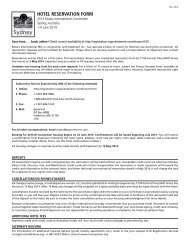DISCURSOS - Rotary International
DISCURSOS - Rotary International
DISCURSOS - Rotary International
Create successful ePaper yourself
Turn your PDF publications into a flip-book with our unique Google optimized e-Paper software.
Diversity in Membership<br />
Sylvia V. Whitlock<br />
Governor, District 5300<br />
An author wrote:<br />
Never judge someone by the way he looks<br />
Or a book by the way it is covered<br />
For inside the tattered pages<br />
There’s a lot to be discovered!<br />
I learned from my grandmother, “Never judge a book by its cover.” I really understood that phrase<br />
only when I had a thought-altering experience many years ago.<br />
I was raised in a third-world culture where class distinctions were the rule of the day and the<br />
main earmarks of prejudice. Because I was a light-skinned black person, I thought myself immune<br />
to the pronouncements of worthlessness heaped on darker-skinned persons. As a young<br />
person unschooled in the history of the black race, my response to differences was largely only<br />
skin-deep. One of the insidious consequences of prejudice is that you can be taught to undervalue<br />
and fear — even hate —groups to which you yourself belong. For South Pacific, the acclaimed<br />
musical commentary on life in the ’40s, Rodgers and Hammerstein wrote the poignant song,<br />
“You’ve Got To Be Carefully Taught.” Lieutenant Cable, a young American conflicted over his love<br />
for a Polynesian girl, sings<br />
You’ve got to be taught to hate and fear,<br />
You’ve got to be taught from year to year.<br />
It’s got to be drummed in your dear little ear.<br />
You’ve got to be carefully taught.<br />
You’ve got to be taught before it’s too late,<br />
Before you are six, or seven, or eight,<br />
To hate all the people your relatives hate.<br />
You’ve got to be carefully taught!<br />
We are all carefully taught, way before kindergarten. My soul-searching moment came when I<br />
ran out of gasoline on a busy New York City expressway and my car sputtered to a halt in the fast<br />
lane, where there was no shoulder. I walked ahead to the police phone to report my plight and<br />
was told by the person on the other end of the line, “If you’re still there in an hour, call us back.”<br />
As I stood there befuddled, a car going in the other direction on the other side of the freeway<br />
pulled up, and the driver, a black man with a ragged handkerchief tied around his head, called out,<br />
“What’s the matter, baby?”<br />
I can’t adequately describe for you the hesitation with which I explained my problem, because I<br />
was looking right at the cover of this man and it was everything I had been taught to avoid. He<br />
said, “I’ll get you some gas, baby,” and in the 10 minutes or so before he returned, a million unpleasant<br />
scenarios played in my head. He returned, poured gasoline from a can into the gas tank,<br />
poured some in the carburetor, and started my car. I offered to give him the $3 I had with me, but<br />
he refused it, saying the gas had cost him only 29 cents. Remember, this was in the 1960s!<br />
I went on my way — I was only about 10 minutes from home — went inside and took a deep<br />
breath to reconstruct what had just happened. What had happened was that I had found, inside<br />
some tattered pages, a gem! I replayed the potentially dangerous situation in my head and<br />
<strong>International</strong> Assembly Speeches 2013 5



![La présidence du club [222-FR] - Rotary International](https://img.yumpu.com/25855726/1/190x245/la-presidence-du-club-222-fr-rotary-international.jpg?quality=85)











![La conférence de district [800-FR] - Rotary International](https://img.yumpu.com/25855636/1/190x245/la-conference-de-district-800-fr-rotary-international.jpg?quality=85)
